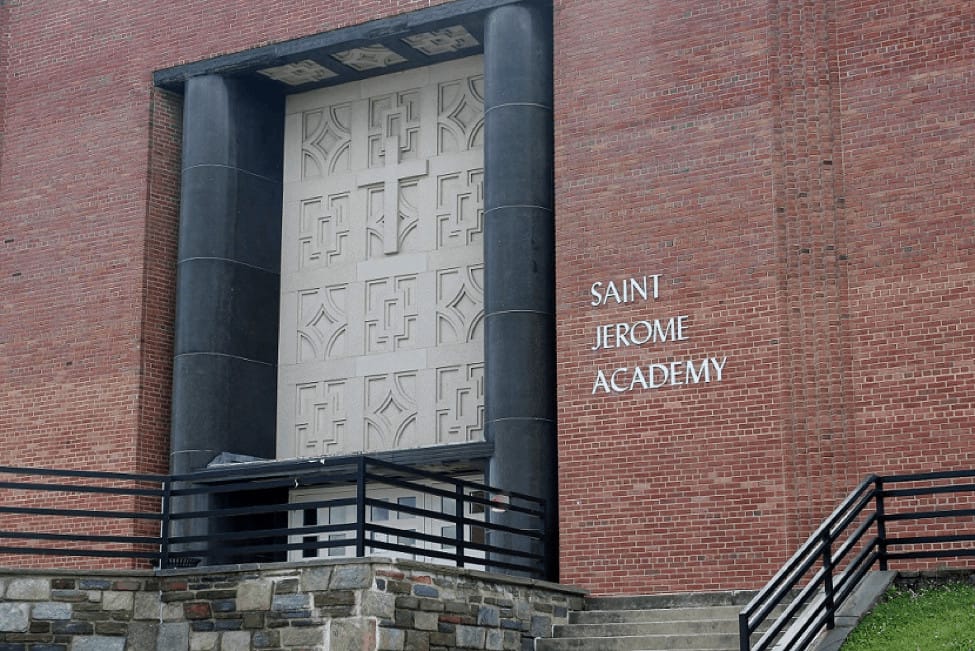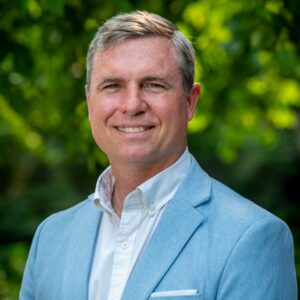
St. Jerome Academy in Hyattsville, Maryland, an ICLE Premier Member School, has become an inspiration to schools that want to offer thoroughly Catholic education. The K-8 parish school was fighting to stay alive in 2009 when a group of parents and parishioners proposed a switch to an authentically Catholic liberal arts curriculum. Now, St. Jerome’s has reached full enrollment, with waiting lists in several grades. The following address was given by Daniel Flynn, Principal of St. Jerome Academy and ICLE Faculty Consultant, to parents and students at Back-to-School Night at St. Jerome Church in Hyattsville, MD, on September 13, 2023. His speech articulates the beautiful vision of Catholic liberal arts education in a fresh and compelling manner.

Daniel Flynn, Principal of St. Jerome Academy and ICLE Faculty Consultant
This year marks the 80th Anniversary of St Jerome Academy. Eighty years of educating students in Hyattsville and, for some families, multiple generations. Over the years, hundreds of families have moved to Hyattsville with the sole purpose of educating their children here.
When providing a one-line synopsis of The Educational Plan of St. Jerome Academy, one of the chief architects of the plan, Michael Hanby, said, we are giving them something better to love. He can say this because it is first a gift. Education is a gift. He can say this because many modern educational systems bypass love and virtue altogether and replace them with utility or acquisition of skills.
Skills and methods are fine, but we need to be careful about letting them define us.
Each year during Holy Week, we recall the words of Pontius Pilot: Quid est Veritas? What is Truth? This question always strikes me.
It is different from the obvious question he could have asked Jesus right away and the only one that seemed to matter at the moment: Are You the Son of God?
So where does truth start? In our case, truth starts with the word.
Christ himself tells us in John’s gospel Ch. 14, “I am the way, the truth, and the life.” He shows that he is not only the truth, but the reason!
God reveals himself through Scripture, and through our reason, we come to understand him more fully. He reveals himself in the person of Jesus Christ. This opens our minds to the fullness of truth and ensures that our faith is rooted in reason.
You see, children can be taught things like apologetics, theology of the body, Phonics, math, spelling, iconography, and music. Their innate desire to know is healthy, and when educators unpack the truth, the virtue of trust is built.
By using great questions, observations, induction and deduction, comparing and contrasting, and debates, students are learning the truth at a rapid rate. For example, they learn that gravity is gravity, and it doesn’t change because someone disagrees with it. Have some students drop enough objects from various heights, and they will tell you exactly what the truth of it is. Truths have a lasting effect the earlier you learn them.
This continues into adulthood as well. A stop sign is always telling you to stop. It is not an optional suggestion.
However, truth is more than skin deep. Once you accept the truth, there are deeper truths to be revealed. By having students not just stop to smell the roses but to actually consider everything that makes it a rose itself in the first place: why does it symbolize love or forgiveness? Why are the petals so soft? What makes a rose different from a lily? Why does it burst forth from the center and spray outward? Why does it have thorns?
If our goal is to unveil something to the children that they will ultimately fall in love with, you have to share in that love. As adults, we have to be drawn to reflection over reaction. If we are trying to give them something better to love and expose them to the abiding things, we have to wake them up early to experience the sunrise, watch the rain fall, make them show all of their work in math, teach them to write in a logical manner, and help them examine their conscience in preparation for confession. These truths must be manifested for them. The Educational Plan of SJA helps you achieve this reflection.
When you strip away the multiple choice questions, the answers found in the back of the textbook, and stop writing the objectives on the board, the students get to discover the truth and own it. When you challenge them to memorize a full poem, to spend multiple lessons on a primary source, or require that they take an opposing side in a debate, you push them beyond their comfort zone so they can better know themselves. More importantly, when you unveil a truth for a child, and they receive it, you are sowing the seeds of love for them.
But why do this? It requires more work, more research, more prayer, and more patience. It’s also far more fulfilling. It’s pretty clear when teachers fall in love with this model.
I have watched students come alive when they learn the truth about St. Thomas More’s conviction, Odysseus’ resolve, or Abraham Lincoln’s agony over division. For some students, it is as if they are living alongside these leaders.
Most importantly, when the logos is incarnated, it speaks to the soul of the child. They learn about the person of Christ through Scripture and catechesis, they see witnesses through loved ones, and then meet Christ in the Eucharist. This is the truth revealed. If you become what you behold, what are you beholden to? Shouldn’t we behold the lamb of God? If we want our students to answer the question “What is Truth?” 30 years from now, will we have had the same impact on them as the social culture of their time and beyond? And what will your student’s answer be? Will they be able to explain the truth about Jesus Christ? Can they define how Truth, Beauty, and Goodness are found in the human person, in nature, in math and science?
There are a myriad of reasons why parents choose a particular school for their child. In the end, the school is tasked with educating and perhaps more importantly, forming the student, at least while they are in their care. After all, parents probably don’t only want to know what their kid will study but what kind of person they will become and how this will change you as a parent.
Parenting affords us a similar opportunity. Parents don’t exist merely to send kids out the door at 18. You are raising a family so that, hopefully, they will one day form a family of their own.
At the ICLE conference, Bishop James Conley of Lincoln, Nebraska, shared that “Education in the Liberal Arts reminds us why we are human and what that actually means.” It seems obvious to state something like this, but look around and notice all of the schools focused on just math and reading or boasting of acronyms and buzzwords or talking about acceptance rates and scholarship money. Those things are fine and good, but is that why we open our doors each morning? Plato says that the end or purpose of education is the cultivation of virtue to form a good person.
We could easily add on the capacity to know and love the truth, to act in freedom, to reason, to discipline, to train healthy desires. To develop our memory and our attention. By developing what is most human, we surrender our will to His. Or as St Bernadette of Soubirous said, “ I must Become a Saint. My Jesus expects it.”
School is not merely about learning just something or anything, just as parenting is not merely about raising a child into an adult. There is a deliberate intentionality to these processes. You are very considerate about what you select to do in your leisure time and in your dinner conversation topics, just as the school manages a balanced schedule with specific content and the full person in mind.
Both family and school are necessary formative arenas to raise a child into a saint. The family and the school both stretch and push equally on the parents and the students to grow. I recently saw a sign that read: When you are a kid, you don’t realize that you are also watching your parents grow up in front of you.
In both education and parenting, we learn a lot as we go. It is worth considering: When they do finish their formal schooling, this is when the real tests appear, so how will they do?
In this year dedicated to the Eucharist, let us strive to be restored in Christ through the sacraments, adoration, and sitting at the foot of the cross. There will be times when the school needs to communicate more clearly, when adults need to give each other the benefit of the doubt, and perhaps times when we need to apologize to each other. In the end, we both share a deep interest and personal responsibility for the children who have been entrusted to us. We are both aiming to build a culture of virtue, and we must meet at the Eucharist.
The Educational Plan of St. Jerome Academy states: “We begin with the sort of person we hope would emerge after nine years at St. Jerome. The skills, aptitudes, and habits we hope to cultivate are like the tools of learning. Various teachers will contribute to the building up of the whole.” (cf. p 5)
During this new year, I hope you realize that our school is deeply invested in preparing students for eternal salvation, the first gift from the original teacher, Jesus Christ. May He serve as our model and guide in forming children.
